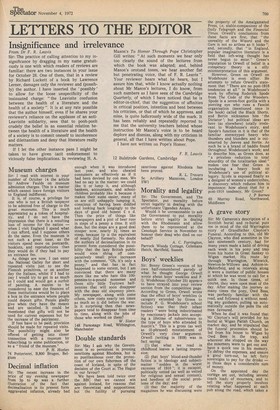Boys weeklies
Sir: Benny Green's version of his own half-remembered parody of what he thought George Orwell wrote about boys' weeklies and P. G. Wodehouse (October 23) appears to have strayed into your review section from the competition page. According to Green, Orwell wrote that the effect of boys' weeklies (a category extended by Green to include P. G. Wodehouse's school fiction) was that their infant readers "were being indoctrinated by reactionary jackals into accepting a lifetime of subservience to the type of boys who attended St Austin's." This is a gross (as well as ill-phrased) misstatement of Orwell's very clear argument. Orwell (writing in 1939) was in fact saying: (1) that what we read in childhood leaves a lasting impression; (2) that boys' blood-and-thunder fiction is in ideology and subjectmatter "sodden in the worst excesses of 1910 "; it is escapist, politically vetted (as well as vetted for religious and sexual content), and heedless of the social problems of the day; and (3) that the majority of the magazines he was discussing were
the property of the Amalgamated Press, i.e. stable-companions of the Daily Telegraph and the Financial Times. Orwell's conclusions from these facts are first, that "the unreality of the Wizard and the Gem is not so artless as it looks "; and, secondly, that "in England, popular imaginative literature is a field that left-wing thought has never begun to enter." Green's imputation to Orwell of belief in a conspiracy theory is a silly misinterpretation of this argument.
However, Green on Orwell on Wodehouse is even sillier. He attempts to refute Orwell's statement that "There are no post-1918 tendencies at all " in Wodehouse's work by offering Roderick Spode from The Code of the Woosters. Spode is a seven-foot gorilla with a piercing eye who runs a Fascist organisation (mentioned once in the book) called the Black Shorts, and Bertie nicknames him 'the Dictator '; but political ideas are here (as elsewhere) totally irrelevant to Wodehouse's story, and Spode's function in it is that of the familiar stereotyped heavy who thunders and blunders and is outsmarted by Jeeves and Bertie. As such he is a brand of baddie found throughout Wodehouse's work; and to describe him, as Green does, as " a priceless reduction to total absurdity of the totalitarian ideal " makes one fear that Green is incubating a heavy book on Wodehouse's use of political allegory. Sr ode is exposed finally as a designer of women's underclothes, a discovery which reduces him to impotence: how about that for a post-1915 tendency, Mr Green?
J. P Barnes 65 Murray Road, Northwood, Middlesex








































 Previous page
Previous page